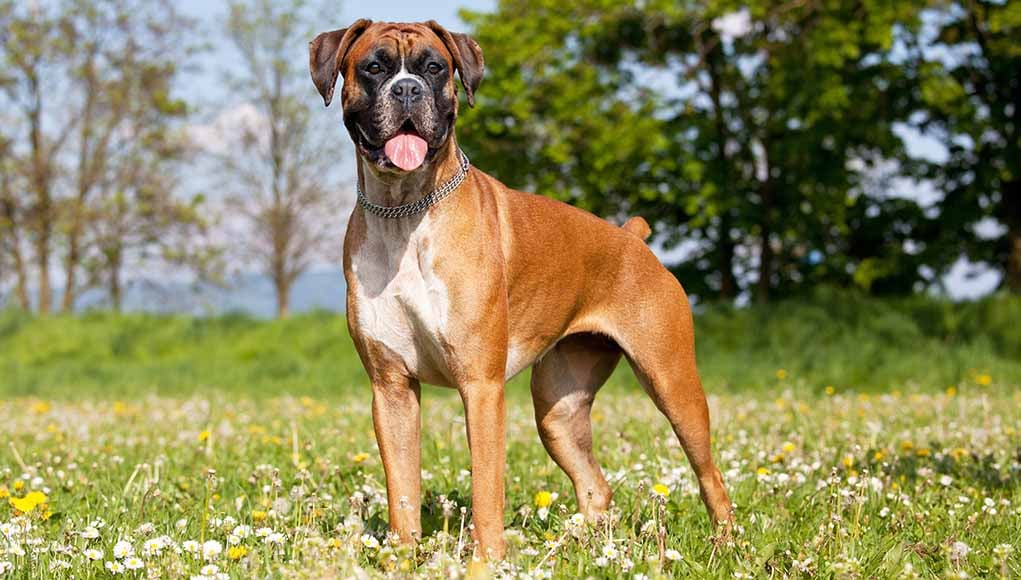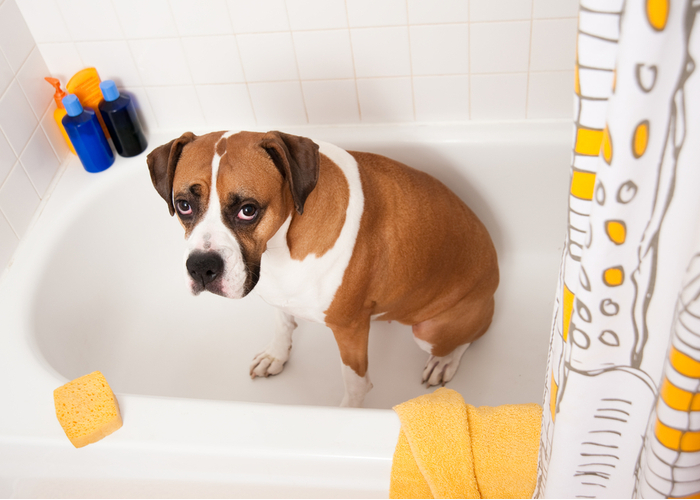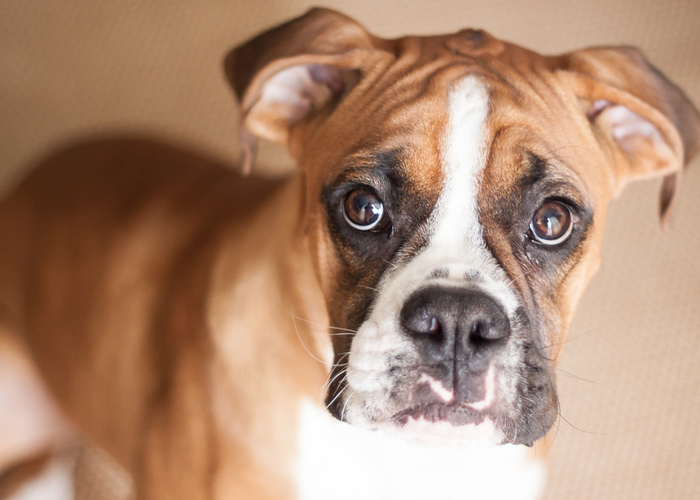Table of Contents
- Significant Characteristics of a Boxer Dog
- Personality and Temperament of a Boxer Dog
- Grooming A Boxer Dog
- How To Feed a Boxer Dog?
- Boxer's Living Arrangement
- Boxer Dogs with Children and Other Pets
- History of Boxer Dogs
- The Lifespan of a Boxer
- Where To Get a Boxer Dog?
- Important Things To Note When Having a Boxer Dog
- Final Thoughts on the Boxer Dog Breed
The wonderful Boxer dog is loyal, loving, intelligent, has a great work ethic, and has good looks. He is a total doggy package!
Alert and always courageous, Boxers have been one of America's most popular dog breeds for a very long period.
Although they can be intimidating at first, they can be playful with a passionate personality when you get to know them.
If you want a dog that is easy to groom, high in energy, and family-friendly, then this Boxer dog is the best fit for you!
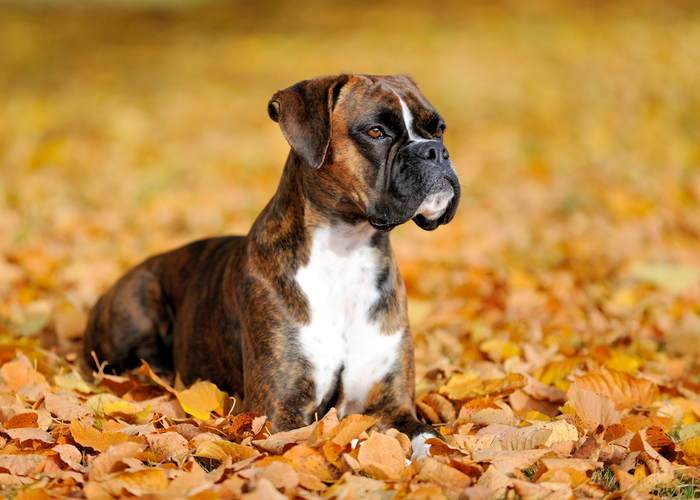
Significant Characteristics of a Boxer Dog
Boxers have this playful nature and limitless energy to be called the “Peter Pan” of the dog world.
They have one of the most extended puppy hoods since they don't mature enough unless they turn three.
Boxers are loyal to their family and love to play with them, but they can be stubborn sometimes, especially if you try to be harsh with them during training.
Due to their loving personality, they can be mistaken as a lapdog and will lie close to you.
They don't trust strangers easily but will not be aggressive unless they smell a threat coming their way.
Boxers have high energy and will need lots of exercise. It's best to provide them with enough physical activities and plays.
Boxers love to be around their owners all the time! If left alone or kept in a backyard away from people, they will be ill-mannered and destructive to things.
They drool a lot and snore so loud!
Boxers are brilliant and respond well to training. They also possess an independent trait which means they don't like being bossed around.
You'll gain the heart of a boxer if you can make their training an enjoyable one!
They are excellent watchdogs, too, as they take their guarding duties as seriously as possible.
RELATED ARTICLE: How to Deal with Resource Guarding in Dogs
Size
Male Boxer has a height of 22.5 to 25 inches at the shoulder and can weigh about 70 pounds. At the same time, a female Boxer bears a size of 21 to 23.5 inches and weighs about 60 pounds.
Physical Characteristics
Boxers have solid and muscular bodies and square jaws. They have broad, short skulls with square muzzles.
They are also underbite, combined with their long jaws, which can often lead to a fantastic head-out-of-the-window car ride.
Boxers have short coats with tight skin covering their muscular bodies. They usually come in two colors: fawn Boxer or brindle Boxer.
Fawn ranges from light brown to mahogany. On the other hand, brindle has a tiger-shaped pattern of black stripes on a fawn background.
White markings usually appear in the belly or feet and won't cover more than 1/3 of the coat. When the white markings extend up to the neck, it will be called flashy fawn or flashy brindle.
Boxers with no white markings are called plain Boxers.
A Boxer with more than 1/3 white markings in his body is already disqualifying the breed standard. Excessive white markings make them very vulnerable to health conditions such as skin cancer and deafness.
Boxers have a black mask around their face, sometimes with a white stripe running up to their muzzle between their eyes.
Note: Boxers don't have a black coat.
Personality and Temperament of a Boxer Dog
Boxers do love getting lots of attention. They are also intelligent but can be stubborn at times, but with enough training, they can be very well-mannered.
They are so focused on being with their loved ones, and you can count on them when something wrong is around the corner, making them excellent guard dogs.
Boxer owners love the funny personality of this breed.
Boxers are very energetic and happy. When they are excited, they often do a little happy dance by twisting their bodies in a semi-circle look and turning around.
They also produce a unique sound, a “woo-woo,” when they want something, or they're just plain excited.
Despite being joined in dog fights in the past years, Boxers are still gentle dogs without aggressive tendencies.
Boxers love to jump on people! This can be minimized when they are being trained properly.
As a breed with an athletic breed, Boxers need a significant amount of exercise to be physically healthy and mentally stimulated.
Unlike other dog breeds, they are not the type to dig holes and bark inappropriately.
Grooming A Boxer Dog
Boxers shed a little, but weekly brushing with a bristle brush or using a hard rubber grooming mitt can help keep the hairs at bay.
You can enhance the natural shine of your Boxer's coat by frequently rubbing a chamois cloth against it.
Note: If you use a shedding blade, be careful not to injure your Boxer.
Dental hygiene and trimming of nails are part of keeping your Boxer clean and healthy. Brush his teeth every day to remove the buildup of tartar and other bacteria. This can also prevent periodontal disease in your Boxer.
Although an active Boxer may wear down his nails, it's still best to trim his nails at least once or twice a month to avoid getting scratches when they begin to be jumpy on you.
Its ears should have no block of wax, and its eyes should be clear with no discharges or redness.
As you clean your Boxer, check for any signs of infections like redness, inflammation, or tenderness, also if there are any sores or rashes around his body.
A weekly inspection on their eyes, ears, nose, mouth, and feet, will help you see any potential infection that may need professional help in the long run.
RELATED ARTICLE: Grooming Your Dog at Home
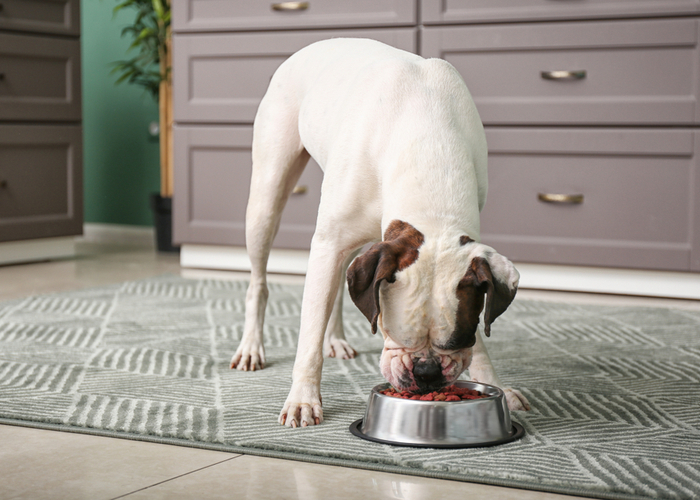
How To Feed a Boxer Dog?
A boxer diet needs two meals a day with 2 to 3 cups of high-quality dry dog food. This is to keep him in his best health.
Boxers are prone to experiencing stomach torsion, a condition where the stomach twists around its axis. It's essential to provide them with a feeding set-up to prevent them from bending too much to eat.
Monitor your Boxer's health because overfeeding him might not be a good idea. Giving treats while training is a good reward, but too much treat may lead to obesity.
Like any other dog breed, the dietary plan for Boxers changes from puppyhood to adulthood and may continue to change when they get old enough.
Ask your trusted veterinary doctor for any suggestions for the best food diet intended for your Boxer dog.
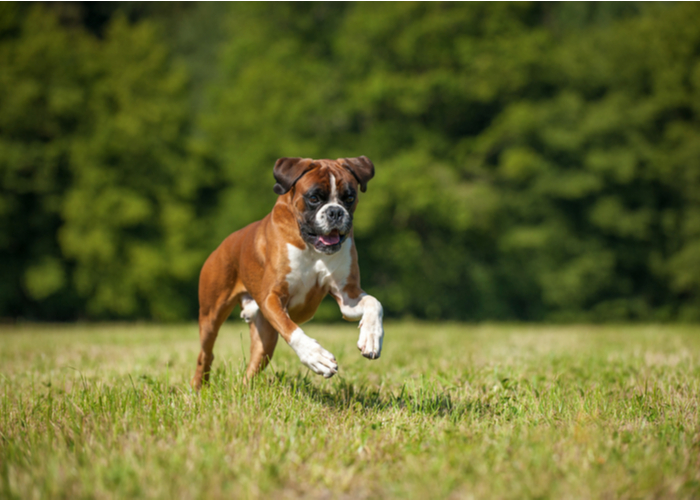
Boxer's Living Arrangement
Boxers are the most versatile dogs and have high needs for companionship. They don't mind spending more time with you inside your house.
But they also need to go out for walks and play from time to time.
They are ideal for people who want dog companionship and in a house with a large family and are occupied most of the time.
Boxers can also do well both in the countryside and in a city apartment as long as they have room to release their excess energies. When living in an urban setting, regular walks are a must.
Despite being versatile, they don't have a high tolerance to hot weather. They need to be taken care of to prevent heatstroke.
Aside from hot weather, they also need garments as protection during cold weather since they have short coats.
A fence with no escape holes is also advisable as this breed tends to break out yards to go out for a chase.
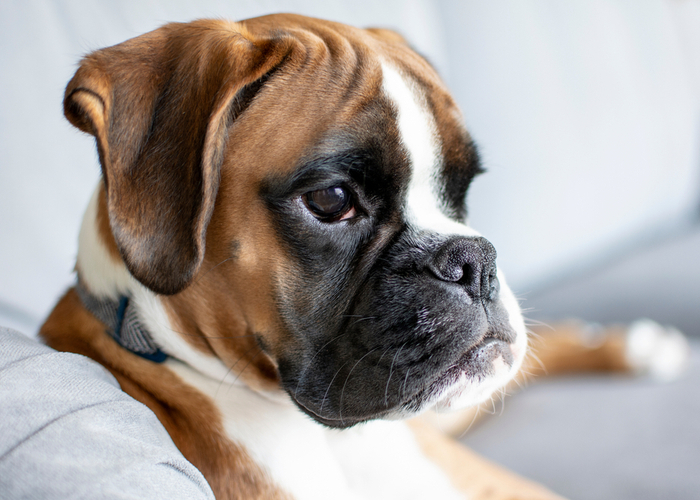
Boxer Dogs with Children and Other Pets
A well-trained Boxer is very patient when dealing with children. They are great playmates for adult children.
But children still need to be supervised when dealing with dogs.
Always be cautious when leaving your Boxer with access to nearby pets from the hood. As catch dogs, they still have their hunting instincts, which can be directed to your neighbor's cat and other kinds of animals.
History of Boxer Dogs
The Boxer breed came from the two central European dog breeds that no longer existed: the Danziger Bullenbeiser and Brabenter Bullenbeiser.
The term Bullenbeiser means bull-biter, and these breeds of dogs were used to catch and hold down prey and hunt bears, wild boars, and deers.
This requires a dog with solid and fast reflexes, a wide powerful jaw, and a lowered nose.
In England, the Bulldog was the most favored breed for this job. While in Germany, a Mastiff-type of dog was used.
Until such time, Bullenbeisers lost their jobs in the states and were demoted to work with the farmers and butchers to guard and drive cattle.
In the 1830s, German hunters put in a lot of effort to produce a new breed, cross-breeding Bullenbeisers with the Mastiff-type, Terriers, and then Bulldogs.
This results in a breed that is tough and fast with a muscular body and a firm grip.
By 1895, a new breed was recognized and is now known as the Boxer. However, the origin of the name is still unknown. It may be derived from the German Box.
Boxers are one of the first dogs to be part of the police and military in Germany.
In 1900, Boxers were already well-known as utility dogs, family pets, and show dogs. The AKC then recognized this breed.
But only in the 1940s, this breed begins to rise to popularity, eventually earning the top 4 spots today in the most popular breed in the United States.
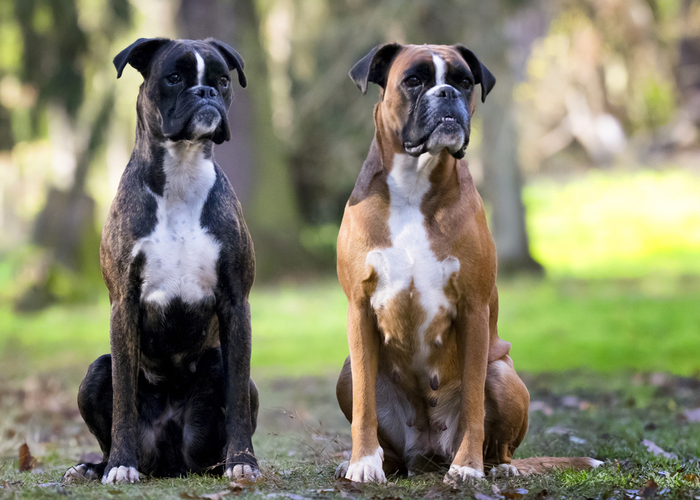
The Lifespan of a Boxer
The average life expectancy for a Boxer breed is 10 to 12 years. Few Boxer owners lose their dogs early because of cancer, and some can reach as old as 16 years.
Dog breeds that pass the American Kennel Club (AKC) standard are less likely to inherit genetic diseases. Regular checkups are advisable in keeping your dog in its best health.
Your veterinary doctor can detect early signs of health diseases before they can severely affect your dog.
Here are some of the diseases that can significantly affect your Boxer:
- Cancer: Boxers are prone to cancers, including mass cell tumors, lymphoma, and skin cancer.
- Aortic Stenosis: The narrowing of the aorta that causes the heart to work more. It's a genetic condition, and dogs bearing this condition should not be put to breeding. It can cause fainting and sudden death.
- Deafness: Hearing loss is associated with those Boxers that have white markings.
- Hip Dysplasia: Boxers may experience this hereditary disease that can cause pain and arthritis. Breeders must provide legal papers that the dogs have been tested.
- Allergies: Boxers are also prone to allergies. Consult your vet if you see scaly skin and frequent itching.
Where To Get a Boxer Dog?
Boxer Dog Breeder
When buying from a breeder, you expect to spend more because of their bloodline, appearance, and other specific qualities.
It's best to choose a breeder who is transparent with the history of the puppy's parents and will give medical records of both the parents and the puppy.
You will expect to pay $500 to $2,500 when purchasing a Boxer puppy from a trusted breeder. The price varies depending on its lineage and how reputable the breeder is.
You can visit the American Boxer Club if you are now on the hunt for a boxer puppy. You can also contact its breeder referral chairperson to connect you to the nearby breeders in your town.
Rescue Groups
It is common to see purebred Boxers in animal shelters. Adult Boxers mostly end up in a shelter because of their energy and large size that their owner can't contain.
If you're one of the few people that are not up to raising a Boxer puppy but are willing to be a fur parent, a rescue Boxer dog can be an excellent option for you!
When you adopt a Boxer from a shelter, you will pay at least $50 to $200. Aside from being cheap, every rescue dog is already fully vaccinated and spayed/neutered, so you are spared from spending on this medical service.
Here's a list of several rescue groups for you to start your search on where to adopt a Boxer dog:
- Boxer Angels Rescue
- American Boxer Rescue Association
- Boxer Buddies Rescue and Adoption
- Boxer Rebound, Inc.
Important Things To Note When Having a Boxer Dog
There are lots of considerations if you decide to have a Boxer as an addition to your family:
- Regular Training – Although an intelligent breed, Boxers don't take their training seriously, so they require a firm owner in handling them.
- Don't Make Them Reach Boredom – Boxers need to be physically and mentally active so give them at least an hour every day for walks, fetch, or just running around the yard.
- They Are Sensitive to Heat – Boxers are susceptible to heat due to their short coats. They are best in places that are not hot or humid all year.
Final Thoughts on the Boxer Dog Breed
If you think you can handle a Boxer dog and can provide all his needs, then what are you waiting for?
Go to the nearest Boxer rescue shelters in your area to adopt or visit the website of American Boxer Club and contact the in charge if you want to purchase from a reputable Boxer breeder.


